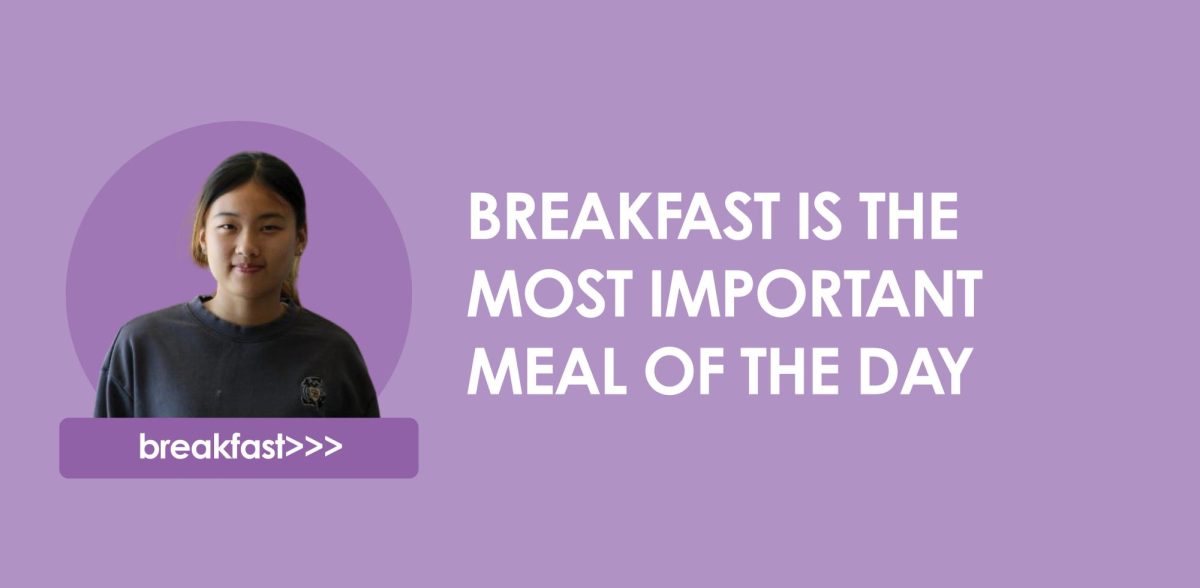“Breakfast is the most important meal of the day” is an outdated saying. A 2016 study published in the National Library of Medicine found that nearly one-quarter of individuals in the U.S. skip breakfast daily.
This is why joining the 25% of breakfast-skippers would not be a good idea.
Eating breakfast is beneficial both in the short term and long. On a given day, breakfast provides the necessary nutrients and fuel for the rest of the afternoon, bolstering energy levels and concentration. According to Better Health, a Department of Health approved webpage, glycogen stores are low when waking up in the morning. Once the energy is expended, the body’s ability to function is negatively affected.
Skipping breakfast may seem like a good way to reduce overall energy expenditure; however, skipping breakfast only provides opportunities to overeat at lunch or dinner, possibly promoting disordered eating habits. This may indicate serious issues like eating disorders, which may prove to pose more chronic issues in regards to physical and mental health. Furthermore, people who skip breakfast may fail to meet their recommended intakes of fiber and vitamins, according to the Department of Agriculture. Although on a day-to-day basis, falling short on nutrition goals may not serve as a major concern, long-term issues are another story.
One long-term benefit of eating breakfast is the reduced risk of cardiovascular disease and other issues. Registered dietitian Lindsey DeSoto shared a 2021 study that found that eating breakfast reduced the risk of health issues. Heart disease, diabetes, obesity and high blood pressure are some examples. Moreover, a 2017 experiment showed that skipping breakfast disrupted the subjects’ circadian rhythms in both healthy and diabetic participants. This disrupts one’s bodily functions and sleep schedules. Not only is this a negative impact in general, but is also especially detrimental to students in high school. Thus, someone struggling in school might want to try eating breakfast.
In support of this message, nutritionist Katie Adolphus said she associates breakfast with quality diets, healthy weight and physical functionality, as well as lifestyle factors, like school performance and cognition. Her 2013 study found evidence that frequent breakfast-consumers had higher academic performances, with the clearest effects on math test scores and grades.
Even disregarding the scientific evidence, though, breakfast foods are undeniably tasty. Whether you have a taste for the sweet or savory, there are satisfactory options that are tasty, healthy and convenient. Waffles and yogurt or omelet and toast could be decent breakfast options.
Therefore after citing the text above, I would advise you to wake up, have some cereal and then face the day ahead.
The views in this column do not necessarily reflect the views of the HiLite staff. Reach Ivy Zhen at [email protected].




























![Keep the New Gloves: Fighter Safety Is Non-Negotiable [opinion]](https://hilite.org/wp-content/uploads/2024/12/ufcglovescolumncover-1200x471.png)






!["Wicked" poster controversy sparks a debate about the importance of accuracy versus artistic freedom [opinion]](https://hilite.org/wp-content/uploads/2024/11/riva-perspective-cover-1200x471.jpg)









































![Review: “We Live in Time” leaves you wanting more [MUSE]](https://hilite.org/wp-content/uploads/2024/12/IMG_6358.jpg)
![Review: The premise of "Culinary Class Wars" is refreshingly unique and deserving of more attention [MUSE]](https://hilite.org/wp-content/uploads/2024/12/MUSE-class-wars-cover-2.png)
![Introducing: "The Muses Who Stole Christmas," a collection of reviews for you to follow through winter [MUSE]](https://hilite.org/wp-content/uploads/2024/12/winter-muse-4.gif)
![Review: "Meet Me Next Christmas" is a cheesy and predictable watch, but it was worth every minute [MUSE]](https://hilite.org/wp-content/uploads/2024/11/AAAAQVfRG2gwEuLhXTGm3856HuX2MTNs31Ok7fGgIVCoZbyeugVs1F4DZs-DgP0XadTDrnXHlbQo4DerjRXand9H1JKPM06cENmLl2RsINud2DMqIHzpXFS2n4zOkL3dr5m5i0nIVb3Cu3ataT_W2zGeDAJNd_E-1200x884.jpg)
![Review: "Gilmore Girls", the perfect fall show [MUSE]](https://hilite.org/wp-content/uploads/2024/11/gilmore-girls.png)
![Review in Print: Maripaz Villar brings a delightfully unique style to the world of WEBTOON [MUSE]](https://hilite.org/wp-content/uploads/2023/12/maripazcover-1200x960.jpg)
![Review: “The Sword of Kaigen” is a masterpiece [MUSE]](https://hilite.org/wp-content/uploads/2023/11/Screenshot-2023-11-26-201051.png)
![Review: Gateron Oil Kings, great linear switches, okay price [MUSE]](https://hilite.org/wp-content/uploads/2023/11/Screenshot-2023-11-26-200553.png)
![Review: “A Haunting in Venice” is a significant improvement from other Agatha Christie adaptations [MUSE]](https://hilite.org/wp-content/uploads/2023/11/e7ee2938a6d422669771bce6d8088521.jpg)
![Review: A Thanksgiving story from elementary school, still just as interesting [MUSE]](https://hilite.org/wp-content/uploads/2023/11/Screenshot-2023-11-26-195514-987x1200.png)
![Review: "When I Fly Towards You", cute, uplifting youth drama [MUSE]](https://hilite.org/wp-content/uploads/2023/09/When-I-Fly-Towards-You-Chinese-drama.png)
![Postcards from Muse: Hawaii Travel Diary [MUSE]](https://hilite.org/wp-content/uploads/2023/09/My-project-1-1200x1200.jpg)
![Review: "Ladybug & Cat Noir: The Movie," departure from original show [MUSE]](https://hilite.org/wp-content/uploads/2023/09/Ladybug__Cat_Noir_-_The_Movie_poster.jpg)
![Review in Print: "Hidden Love" is the cute, uplifting drama everyone needs [MUSE]](https://hilite.org/wp-content/uploads/2023/09/hiddenlovecover-e1693597208225-1030x1200.png)
![Review in Print: "Heartstopper" is the heartwarming queer romance we all need [MUSE]](https://hilite.org/wp-content/uploads/2023/08/museheartstoppercover-1200x654.png)




